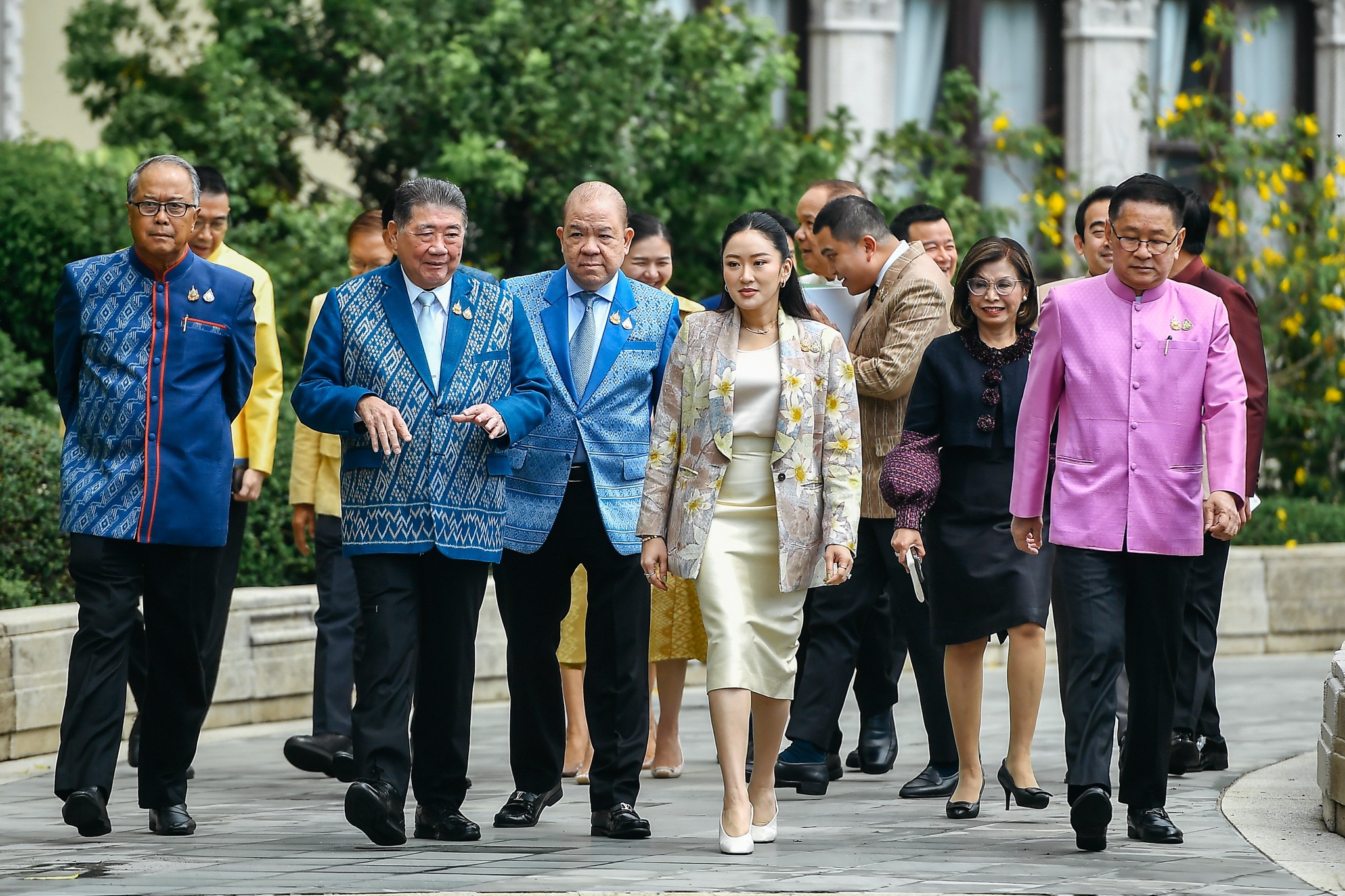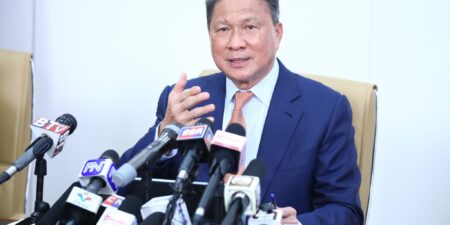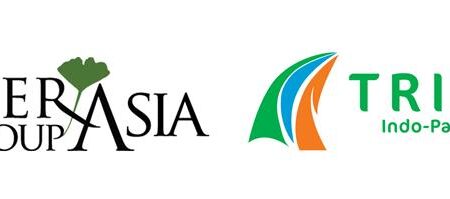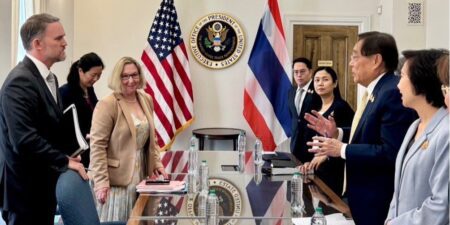BGA Senior Adviser Dr. Thitinan Pongsudhirak wrote an update to clients on Thailand’s challenges following the U.S. tariff announcement.
Thailand is in deeper trouble compared to its peers in the face of U.S. President Donald Trump’s “reciprocal” tariffs announced on April 2. Several policy missteps from an ill-advised deportation of Uyghurs to China and the reception of Myanmar’s junta chief to the controversial arrest of an American academic have undermined Thailand-U.S. relations at a time when Bangkok needs to navigate and negotiate a tariff deal in Washington. Unless there is a course correction to regain a new geostrategic balance and turn the external tariff shock into domestic reform opportunities, Thailand risks alienating the United States and gravitating further into China’s orbit, potentially ushering in the beginning of the end of the long-standing Thai-U.S. treaty alliance.
Thai-U.S. relations under Trump’s second term got off to a bad start with the forced return of 40 Uyghurs February 27 under a shroud of secrecy and subterfuge. The Muslim Uyghurs were among more than 200 who fled persecution from China’s Xinjiang province to seek refuge in Thailand in early 2014. In July 2015, 109 of them were forcefully sent back to China by Thailand’s military government that seized power in a coup in May 2014. One month after deportation, an apparent act of terrorist bombing reprisal at the Erawan Shrine in downtown Bangkok claimed 20 lives and injured 125, scaring off tourists for months.
In its latest Uyghurs deportation, the Thai government betrayed U.S. Secretary of State Marco Rubio’s statement during his Senate confirmation hearing January 15 that Thailand as a U.S. ally would do no such thing. When it happened, Rubio swiftly imposed visa restrictions on Thai officials for their “complicity.” It is understood that senior Thai officials involved presumably went up the chain of command to Prime Minister Paetongtarn Shinawatra and Deputy Prime Minister and Defense Minister Phumtham Wechayachai, not to mention the heads of the National Security Council and National Police Office. Thai-U.S. relations were strained as a result, complicating Thailand’s official response to the Trump tariffs, which placed a 36 percent levy on Thai exports to the United States.
Sensing an opportunity to push back against Washington and more importantly to draw Bangkok closer, the Chinese Foreign Ministry defended and urged Thailand not to submit, while accusing Washington of bullying. The Uyghurs case was a Chinese squeeze and a test on the Thai government to take sides. It exposed Thailand as an open pawn in the U.S.-China conflict. Beijing’s leverage was partly that Thailand’s King Maha Vajiralongkorn is reportedly due to visit China later this year to commemorate the 50th anniversary of Thailand-China relations. The king’s trip to Bhutan last month — the first royal state visit to another country since he ascended the throne in December 2016 – was seen as groundwork for going to China. Friction with Washington over tariffs, alongside head-of-state level engagement with Beijing, puts the Thai-U.S. alliance at an inflection point.
In addition to the Uyghurs deportation, the Paetongtarn government in early April invited and received Senior Gen. Min Aung Hlaing at the Bay of Bengal Initiative for Multi-Sectoral Technical and Economic Cooperation (BIMSTEC) summit. Min Aung Hlaing has been internationally reviled and ostracized after staging a military coup in February 2021 and plunging Myanmar into a dark and deadly civil war with dire and desperate economic conditions for its people. Photographs of the Thai prime minister’s warm handshake with the Myanmar dictator marginalized and further diminished Thailand’s global standing. While the Trump administration may not be focused on Myanmar, opposition to the coupmaker in Washington is bipartisan. Engaging Min Aung Hlaing will likely not make it any easier for the Paetongtarn government to find access and ways forward in the Beltway.
To make matters worse, just after the Min Aung Hlaing controversy, the Thai authorities arrested Paul Chambers, a well-regarded American scholar who works at Naresuan University in Phitsanulok province of central Thailand. He was charged with lese majeste, or royal defamation, by the commander of the Third Army for a publicity flyer of a lecture on the Thai military he delivered at a Singapore research institute last October. The case quickly caught the attention of U.S. officials, including those at the State Department, senators of his home state of Oklahoma and the American Political Science Association.
In a matter of days, it became an international incident and an impediment in the Thai government’s tariff-negotiation efforts. This is a time when the Trump administration goes after foreign governments that are seen to be going after American companies and individuals. Unsurprisingly, the Thai Public Prosecutors have dismissed the charge. However, Thai immigration authorities have revoked Chambers’ visa and confiscated his passport, and the university terminated his employment. In other words, he is still being persecuted and therefore an unnecessary variable in Thai-U.S. relations and negotiations.
With the Trump tariffs as external shock and Thailand’s policy miscalculations, the routine squabbling and outflanking maneuvers in the Paetongtarn-led coalition government cannot be more poorly timed. While 38-year-old Paetongtarn is now seen as a novice not up to the task of governing in the face of mounting adversity, her influential father and de facto Pheu Thai party leader Thaksin Shinawatra is hamstrung by charges of royal defamation and violation of his incarceration terms after returning from exile. Pheu Thai also does not have sufficient parliamentary strength to put Bhumjaithai party, a junior coalition partner, in its place. Rumors of a Cabinet reshuffle and Paetongtarn’s and Thaksin’s political demise have kept the ruling coalition unsteady and unstable, divided into different silos of Cabinet portfolios.
It was thus not surprising when Thailand’s negotiating team, headed by Deputy Prime Minister and Finance Minister Pichai Chunhavajira, twice postponed trips to Washington. With such a fractious coalition government, besides policy shortcomings and lack of a clear game plan, Thailand is in deeper trouble than others. Vietnam faces a higher tariff rate of 46 percent, but its officials have political stability and continuity to work with. Malaysia comes in at 24 percent with more maneuvering room. The Thai government must get its act together in short order if it is going to come out of the Trump tariff offensive in decent shape.
Businesses should watch if Thailand’s negotiations team can find optimal access points and come up with a balanced package of concessions and trade-offs that can bring down U.S. tariffs on Thailand to create a level playing field. If signs emerge that the Trump tariffs are forcing Thai big businesses to agree to adjustment and reform in favor of greater domestic and international competition, investors should place more confidence in the Thai economy. Business should be aware that in Thailand, relative political stability is not at issue. Political fragmentation and policy inertia from a systematic weakening of democratic institutions, such as political parties, are the chief challenge. If this trend changes, Thailand will offer upsides.
We will continue to keep you updated on developments in Thailand as they occur. If you have comments or questions, please contact BGA Senior Adviser Thitinan Pongsudhirak at thitinan@bowergroupasia.com and BGA Thailand Managing Director Teerasak “Art” Siripant at tsiripant@bowergroupasia.com.
Best regards,
BGA Thailand Team

Senior Advisor
Thitinan is a renowned scholar, journalist and expert in international relations and domestic politics across Asia. He has spent more than three decades analyzing and advising on Thailand and the region’s political economy, geopolitics and policy. He helps BGA and clients understand in-depth the global, regional and domestic issues that affect business. Thitinan is a professor of international relations and international political economy at Bangkok-based Chulalongkorn University’s Faculty of Political Science and a senior fellow at its Institute of Security and International Studies. He has lectured widely at local and international universities, military colleges and international organizations on political and ...
Read More


























